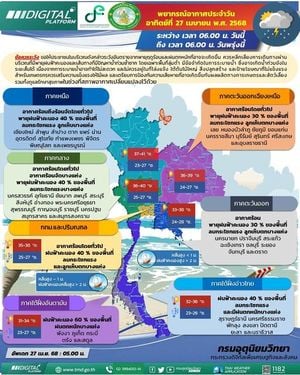A new miniseries, Good American Family, began streaming on March 19, 2025, delving into the deeply controversial real-life story of Natalia Grace, a Ukrainian girl with dwarfism who was accused by her adoptive family of posing as an adult. This captivating series on Hulu stirs public interest by exploring questions surrounding age, identity, and the harrowing landscape of adoption.
Natalia was born on September 4, 2003, with spondyloepiphyseal dysplasia, a condition that affects bone development. Adopted in 2010 by Kristine and Michael Barnett, she initially appeared to be a regular child. However, as time passed, the Barnetts reportedly began to suspect that Natalia was much older than the approximately six years they had been led to believe. They alleged behavioral traits indicative of an adult; for instance, they noted that she had developed adult teeth, showed signs of menstruation, and noted the presence of pubic hair.
Struck by these observations, the Barnetts sought a court ruling to change Natalia's legal birth year from 2003 to 1989, effectively portraying her as a 22-year-old adult. In a shocking twist of events, they abandoned her in an apartment following their legal maneuvering, a decision that led to widespread media coverage and public scrutiny of their motivations.
The miniseries captures this chaotic chapter in Natalia's life, addressing how legal and family dynamics became intertwined with sensationalist narratives. "While defending their family from the daughter they have come to believe is a threat, she fights her own battle to confront her past and the uncertainties of her future," the show's synopsis states, capturing the complex interplay of familial loyalties and individual survival.
After the Barnetts abandoned Natalia in Lafayette, Indiana in 2013, she was taken in by the Mans family, who attempted to adopt her officially. Although the Mans were initially seen as her saviors, the situation soon became turbulent. Reports indicated that Natalia, feeling stifled by the strict environment imposed by the Mans's devout Christian lifestyle, eventually fled, citing a lack of freedom and personal autonomy.
As Natalia explained in an interview, "All I was told was, 'You’re 22 now. Whenever somebody asks you what your age is, you say you’re 22 and you tried to murder your family.'" These revelations paint a portrait of a child grappling with unthinkable challenges and the urgent need to reclaim her identity amidst a circus of external assumptions and accusations.
After a DNA test conducted in January 2024 estimated her age closer to 22, Natalia forged a new path, moving to live with the DePaul family, who also have dwarfism and offered a supportive environment. In their home, she is pursuing driving lessons and studying for her GED, aiming to become a school teacher. Her journey reflects resilience as she navigates the past and builds a promising future.
The adaptation drew significant attention, partially due to Ellen Pompeo's departure from her long-standing role as Meredith Grey in Grey’s Anatomy to take on the complex character of Kristine Barnett. "This series could go very wrong if not handled with sensitivity and awareness. It could easily be misinterpreted," Pompeo shared about her apprehension regarding the portrayal. Ultimately, she found the project offered depth, prompting her involvement.
Mark Duplass, who plays Michael Barnett, articulated the emotional challenge of portraying his character's complex layers, stating, "It was a truly fascinating story to portray." Through intertwined narratives, both actors uncover the foggy ethics of parenthood under the pressures of acute scrutiny and perception.
The series consists of eight episodes, with weekly releases that began with two episodes available on launch day. The anticipation surrounding the show speaks volumes about the continued public fascination with Natalia's case, which has not only inspired a previous film, Orphan, but various documentaries, including the series The Curious Case of Natalia Grace, which aired on Investigation Discovery and included commentary from Michael Barnett himself.
'Good American Family' aims to enrich the dialogue on adoption, disability, and societal perceptions, emerging as both a cautionary tale and a multifaceted narrative of survival and identity. As viewers engage in this intricate saga, they are invited to ponder: Who, truly, is the villain in this nuanced story?









